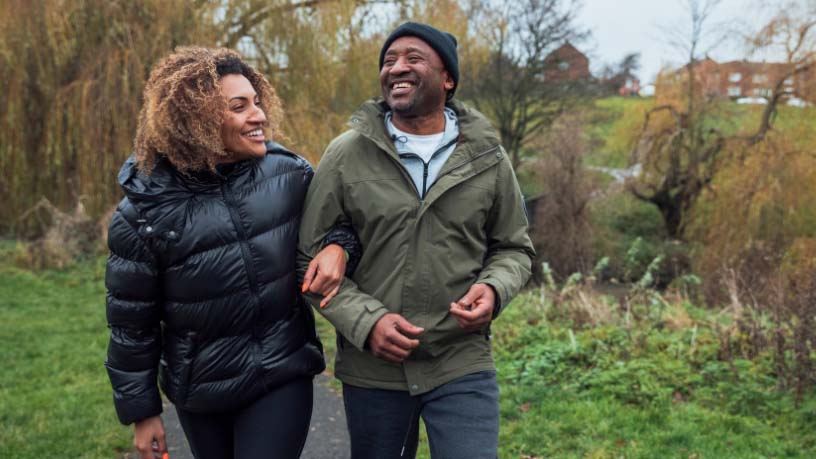Knee surgery carries a number of physical costs, but it's also important to make sure you’re aware of the mental impact.
Key takeaways
Read about Dale Silver’s 13th knee operation, and the emotional journey it led him on.
Getting your mental health on track is an important part of recovering from an operation. Find out how you can improve yours with expert advice.
Dale Silver is a hard-working tradesman who wasn’t particularly phased about the pain he’d feel following his 13th knee operation. But the impact it had on his mental and emotional wellbeing came as a big shock.
“I wasn’t prepared for how emotional it was,” says Dale. “I’ve had 13 knee ops and my pain tolerance is pretty high. But with this one, I was shocked at how traumatic it was.”
This operation hit Dale harder than the others. Not being able to do some of the things he could before, both at home and work, made him worry about his future.
“I’m 53, and I didn’t expect it to be like this, because being younger I’ve got to be so active still,” he says. “I’ve got a family, I’ve got to work. It really affected me because it felt like it was never going to end.”
At his lowest point, Dale found himself depressed and tearful. “I was getting really down,” he says. “That’s when I decided, in conjunction with my wife, to speak to the doctor.”
He found that talking to his physiotherapist, who’s a family friend, and working with his GP really helped him change his negative thought patterns. He also found that staying on top of his medication, along with daily sessions on his electric bike, helped improve his mental health.
Dale wants other people consider the mental impact that knee surgery can have. That is, to think about more than just the physical aspects.
“You’ve got to really get your mind strong because you’re going to have so many ups and downs,” he says.
I think people really need to talk more to the surgeon and even a psychologist, because it’s pretty full on.
Reframing your mindset
According to Sport and Injury Management Psychologist Megan Davis, asking questions and being as informed as possible is crucial when preparing yourself for the mental and physical challenges of knee surgery.
“Right from the go, patients need to be active participants," says Davis, “asking questions, seeing the choices available to them and making that choice rather than feeling like they are passengers in the process.”
Davis adds that it’s important to understand how the recovery process will likely look, so you can stay proactive and set long and short-term goals to get yourself where you need to go.
“Rehab is no fun, and it hurts," she says. “So when you say, ‘Why?’, you need to have the answers.”
Are you in need of urgent support?
We've put together a list of services for free support that's relevant to where you live, and what you're going through.
Davis suggests writing down your goals in pencil, so they’re able to be changed. “It’s when those goals are set in stone and something doesn’t go as planned things can go wrong.”
While acknowledging that knee surgery is a big deal, Davis says you also need perspective around it.
“Keep life front and centre of the focus, and the injury and rehab as something that is going along with that,” she says.
“Sometimes, if people pay too much attention to it, they put injury recovery first and say, ‘Once my knee gets better then I’ll get back to life’. I don’t like that approach.”
Likewise, it pays to keep in mind that, when it comes to surgery and rehab, everybody’s experience is different.
“Knee surgery is a common thing, and everyone’s got a story to tell,” says Davis. “That can be really difficult if you’re not going so well with it and someone else has found it a breeze.”
“Everybody’s experience is different. You can take what’s useful from other people, but don’t compare.”
4 ways to improve your mental health after knee surgery
To get you on track before and after your knee surgery, Davis recommends these top 4 tips:
- Practise mindfulness. This may include meditation, breathwork or journalling, which can all help you step back from being over-absorbed in the recovery process.
- Consider ‘mental’ time travelling. Think about the things you enjoyed doing before the surgery. If you can’t do something in the same way now, think about other ways to engage with that passion. You might also imagine your life 2 years from now. What will it look like after you’ve recovered?
- Use your recovery as an opportunity to start something new. You might learn a language, start a new project or spend more time catching up with people.
- Seek help when you need it. If you’re worried about how you or someone you know is coping following surgery, don’t be afraid to reach out to someone about it. Your GP is usually a good place to start.
Resources
If yours or someone else’s life is in danger, dial 000 immediately.
Lifeline Australia offers 24/7 crisis support online and on the phone at 13 11 14.
Beyond Blue offers 24/7 mental health information and support online and on the phone at 1300 224 636.
Musculoskeletal Health Australia provides information and support for people living with arthritis and musculoskeletal conditions. Visit their website or call them on 1800 263 265.
Pain Australia works towards improving the quality of life for those living with pain. Visit their website for resources and support, including their National Pain Services Directory.

At Bupa, trust is everything
Our health and wellbeing information is regularly reviewed and maintained by a team of healthcare experts, to ensure its relevancy and accuracy. Everyone's health journey is unique and health outcomes vary from person to person.
This content is not a replacement for personalised and specific medical, healthcare, or other professional advice. If you have concerns about your health, see your doctor or other health professional.
You might also like...
Knee surgery: The reality of rehab
Recovering from knee surgery looks different for everyone. Find out about the reality of rehab from 2 people who’ve been through it.
7 things I wish I knew before knee surgery
Knee surgery is a major operation that may require months of intensive recovery. Discover 7 common insights from those who’ve done it.
What to expect from a knee arthroscopy
Your doctor may have recommended a knee arthroscopy. But how much do you know about this surgery?
What you need to know before knee reconstruction surgery
Find out everything you need to know about knee reconstruction surgery and how to set yourself up for your best possible recovery.





